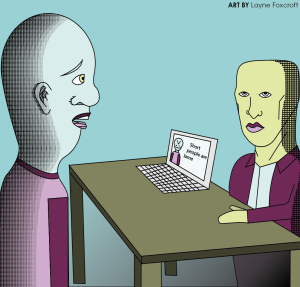New voices sparks a free speech revolution
June 17, 2019
Student journalist unite to fight for school newspapers who experience unfair censorship
New voices is a movement that intends to liberate student journalists from the ruling of the supreme court case, Hazelwood v. Kuhlmeier, and restore the original ruling of Tinker vs. Des Moines.
Hazelwood v. Kuhlmeier is a harsh ruling that was instituted in every state that allows administration to censor school-sponsored publications if they have legitimate concerns.
This discriminatory reality that was ruled in this case repealed the priors of the Tinker vs. Des Moines ruling that stated “teachers nor students shed their constitutional rights at the schoolhouse gate.” Due to the Hazelwood case, there have been many occasions in which the hardworking students of their proud publications have been censored in heinous ways, that are out of line of the administration, and did not pose any harm to their educational institutions.
Since then, many students and their advisors have sparked a revolution to defend their individual rights legally in court, as well as appealing to legislative committees and recently the state senate.
The Dispatch staff as well as the face of the notable movement, Prosper High School EiC Neha Madhira, have participated in hearings and the spread of awareness in order to create justice. Madhira and her staff decided to get involved in New Voices legislation after their publication was unfairly censored by their school’s administration. There is absolutely no doubt of these students passion for journalism as well as individual liberties. New Voices legislation has passed in 14 states and is pending in another half dozen. We encourage Texas to join them soon.
Constitutional rights are essential when questioning the ruling of these cases, as well as future ones. The first amendment of the U.S. constitution states that congress shall create no laws to limit the freedom of speech, religion, or press which one would possess as a citizen of the United States.
Because these cases can get confusing, and the polarization of politics that factor these decisions, it is essential to take a step back, and remind oneself of the fundamentals of freedoms. Censorship under educational institutions oppresses the future of our country, causing resentment towards those who keep students silent. Censorship should be seen as an injustice to what our founding fathers stood for, no matter the status of their involvement in the country.
Allowing students to publish with no fear of punishment towards their creations, allows them to set boundaries, and learn how to uphold a professional publication themselves. The majority of publications find pride in the painstaking hours of work it takes to create an amazing and informative product.
With the pride that radiates from students hard work on journalistic product does not create a breeding ground for dangers that may upset the school, but one that informs the student body in order to create awareness of the community they belong to. By having truth, there is transparency and awareness, something that is vital to a community as well as a school.
Many argue that because of these forms of media are funded by the public’s tax dollars, that there should be limitations set in place in order to keep these publications from getting ‘out of line’.
Yes, technically these are school-based publications, but because many are not funded directly by a school district, they all should be free from censorship.
Under any law, federal or state, all citizens of the US have the right to free speech and press. No matter the money one would spend in funding a school through tax dollars, it is still up to the publication to respect the rules regarding libel and slander.
Yet, many student stories tend to pertain to the student body and what is current and important to them. Therefore, informing them to further educate the student body, as well as the community with student insights such as commentary pages and trend stories.
By educating the community, students create their own opinions, and decisions, one that a story one would read in the newspaper cannot be directly responsible for.
Information is essential to education, as well as creating awareness to hopefully create change, get involved, and in a negative situation, take charge. Nourish the future and give them these rights in order for them to uphold the importance and establishment of our constitution.
It is essential to uphold individual, and equal rights, no matter the publication, institution, or the age of the creators. The future of journalism remains in students hands, the protection of the future is vital.










